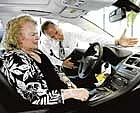

Even though a Lexus ES 350 was involved in a widely publicised accident before the recalls, Lexus sales are up about 5 per cent so far in 2010 compared with last year. That is close to the average for other luxury brands. By contrast, sales of models with the Toyota nameplate fell 15 per cent.
The number of Lexus owners shopping for a new Lexus increased from December 2009 to February 2010, while the number of Toyota owners planning to stay with the brand declined, according to Kelley Blue Book, which tracks vehicle sales and values. Lexus residual values have held steady as Toyota’s have fallen slightly.
Analysts said that sales of Lexus have held up partly because the brand is not included in the most serious recall for sticking accelerator pedals.
Not one of the eight models that Toyota temporarily stopped selling and building was a Lexus.
Only about 500,000 Lexus cars have been recalled, compared with eight million Toyota-brand models.
“Toyota is of course the headliner,” said Stephanie Brinley, an analyst with the consulting firm AutoPacific. “While it seems like everybody already knows that Toyota and Lexus are related, that may not be the case. The Lexus name has not been as criticised.” Separating Lexus from Toyota has been the company’s goal since it started selling Lexus cars in 1989. Toyota officials focused on creating a luxury marque, aimed primarily at Americans, to compete with BMW and Mercedes.
Yet on a per-vehicle basis, Lexus is responsible for more reports of unintended acceleration than the rest of Toyota, federal records show. And more than half of the roughly 300 such complaints to regulators since 2000 about Lexus ES and IS series models — the only two models subject to recall — involve vehicles from years that have not been recalled.
Complaints link the ES series to at least 61 injuries, more than any Toyota model except the Camry sedan. Because Toyota sells about seven Camrys for every one Lexus ES, the ES is linked to more injuries per vehicle. In August, a 2009 ES, since recalled, sped off a highway near San Diego and crashed into a ravine, killing the off-duty California Highway Patrol officer who was driving and three family members, one of whom called 911. The National Highway Traffic Safety Administration recently bought and is conducting tests on a Lexus sedan that took its original owner on an unintended six-mile ride.
That driver, Rhonda Smith of Tennessee, eventually brought the car to a stop and was not injured; her testimony opened a series of hearings in Congress beginning last month. The home page of Toyota’s Web site includes a bright red “Recall Information” message, but the notices are more subtle on Lexus.com. “There are very few Lexus models that have been affected by this,” said John Hanson, a Toyota spokesman. “We are very distinctly different brands and we have different business models. The way they do business is deliberately very different.”
Sales of the Lexus ES and IS series, which are being recalled to prevent their accelerator pedal from becoming trapped beneath the floor mat, are down 6 per cent this year. But sales of other Lexus models are up 12 per cent. For the Toyota division, sales of unrecalled models are down 15 per cent, matching the drop for recalled models. At JM Lexus in Margate, new-vehicle sales are 24 per cent higher than a year ago and showroom traffic is up 17 per cent, said Jim Dunn, the dealership’s Vice President and General Manager.
“Such positive results only underscore that our customers have faith in the Lexus product,” Dunn said. Lexus vehicles also rate highly. The brand placed first in J D Power’s new-vehicle quality study, compared with seventh for Toyota. And Consumer Reports selected the Lexus 460L as the industry’s best overall model.
Such accolades are meaningless to Willette Green, who said her 2006 Lexus ES 330 accelerated suddenly while she was driving it to work in August 2008 on Interstate 90-94 in downtown Chicago.
Green said she could not stop the car as it barreled down an exit ramp, striking and killing a homeless man, hitting another vehicle and smashing through a fence. Green, who suffered lasting injuries in the crash, sued Toyota last month. “Whether it was the electronics or the accelerator pedal, something happened and it wasn’t her fault,” Green’s lawyer, Philip Berenz, said. The death was one of at least eight tied to Lexus crashes in which drivers or passengers blamed sudden acceleration, according to complaint records and lawsuits. The figure includes the four victims of the August 2009 crash near San Diego; relatives of the family sued Toyota.
Three of the seven vehicles involved in the fatal crashes were covered by Toyota’s November recall addressing the potential for floor mats to trap the accelerator pedals. None of the recalls include the model of Green’s car and three 2004 RX 330 sport utility vehicles reported as being in separate fatal crashes as a result of sudden acceleration. Hanson, the Toyota spokesman, said Lexus was not included in January’s recall for sticky accelerator pedals because none of the brand’s vehicles were made with the pedal identified as problematic. “We have found no defect trend that would relate directly to a recall effort,” Hanson said. “There are no Lexus models that have that particular part that has shown that particular defect trend that we noticed.”